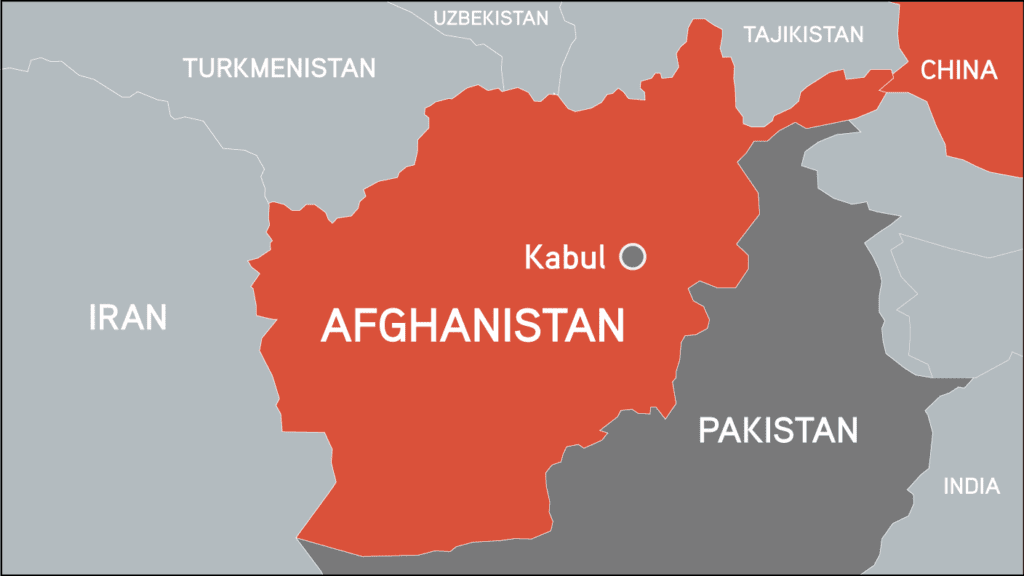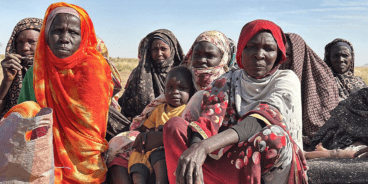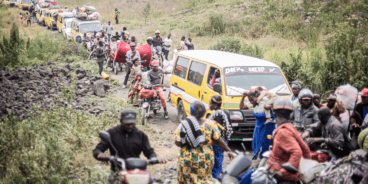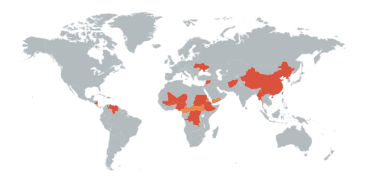Afghanistan

Populations in Afghanistan are facing systematic human rights violations perpetrated by the Taliban de facto authorities. Other armed extremist groups also continue to pose a threat to civilians.
BACKGROUND:
Since Taliban forces effectively overthrew the Afghan government in August 2021, the Taliban and various armed groups, including the so-called Islamic State in Iraq and the Levant-Khorasan (ISIL-K), have committed widespread and systematic human rights violations and abuses throughout the country.
The Taliban de facto authorities have implemented restrictive policies and practices that deny women and girls their human rights, perpetuating extreme forms of gender-based discrimination and flagrantly violating the Convention on the Elimination of All Forms of Discrimination Against Women (CEDAW). Since August 2021 over 100 sweeping repressive edicts, regulations and decrees have been enacted that target women and girls, severely limiting their freedom of movement, freedom of opinion and expression, employment opportunities, political and public representation and access to education and healthcare. In August 2024 the Taliban implemented the so-called “vice and virtue” laws, which aim to eradicate women from public life, including by requiring women to fully cover their faces and prohibiting them from speaking or being heard in public. Edicts implemented in 2024 reinstated public stoning and flogging of women to death for alleged adultery, among other violations of Taliban ideology. The UN Assistance Mission in Afghanistan (UNAMA) has documented arbitrary arrests and detentions of women and girls because of alleged non-compliance with the imposed “Islamic dress code.”
According to the UN Special Rapporteur on the situation of human rights in Afghanistan and the Working Group on Discrimination Against Women and Girls, the Taliban may be perpetrating gender persecution and gender apartheid as they appear to be governing through systematic discrimination with the intent to subject women and girls to total domination. According to UNAMA, Afghan women fear arrest and punishment whenever a new edict is announced due to increased police harassment. Women and girls have reportedly been forcibly taken into police vehicles and subjected to ill-treatment. Shia Hazara women and girls have been disproportionately impacted. Women’s rights activists and gender equality advocates have also faced targeted killings, enforced disappearances, incommunicado detention, attacks and harassment.
UNAMA has also documented evidence of the Taliban committing extrajudicial killings, arbitrary arrests and detentions, incommunicado detention and torture and ill-treatment against media workers, human rights defenders and individuals affiliated with the former government, among other specific groups.
Meanwhile, individuals from ethnic and religious minority communities are frequently targeted by the Taliban, ISIL-K and others. Members of these communities have been arbitrarily arrested, tortured, summarily executed and forced to flee. ISIL-K frequently claims attacks that target Shia Hazara, other Shia Muslims, Sufi Muslims, Sikhs and other minorities, as well as places of worship. The UN Special Rapporteur reported that these attacks appear to be systematic in nature and reflect elements of an organizational policy, likely amounting to crimes against humanity.
The people of Afghanistan are enduring a severe humanitarian crisis, compounded by the impact of sanctions and the freezing of state assets. In December 2021 the UN Security Council adopted Resolution 2615, allowing for humanitarian aid to flow into Afghanistan without violating UN sanctions against the Taliban, which have been in place since 2011.
The Taliban were the de facto authorities in Afghanistan from 1996-2001 before they were overthrown by a North Atlantic Treaty Organization coalition of military forces. During two decades of insurgency against the internationally recognized Afghan government, the Taliban perpetrated likely crimes against humanity and war crimes while Afghan security forces and members of the United States military and Central Intelligence Agency also committed likely war crimes. In March 2020 the International Criminal Court (ICC) launched an investigation into alleged atrocities since July 2002, focusing on crimes by the Taliban and ISIL-K.
RECENT DEVELOPMENTS:
On 23 January the ICC Chief Prosecutor filed applications for arrest warrants for Taliban leaders Haibatullah Akhundzada and Abdul Hakim Haqqani for the crime against humanity of gender-based persecution, marking the Court’s first charges of this kind. In September 2024 Australia, Canada, Germany and the Netherlands announced they were initiating legal proceedings against Afghanistan before the International Court of Justice (ICJ) for violations of CEDAW.
The Taliban have intensified restrictions on rights and freedoms, particularly targeting women, civil society and the press. Before the end of 2024, the Taliban announced plans to revoke the licenses of NGOs employing Afghan women, ban windows overlooking areas where women work or gather and shut down 12 media outlets.
Afghan nationals in Pakistan, including refugees, documented and undocumented migrants, as well as those awaiting resettlement, face growing risks of forced repatriation under a new multistage plan by the Pakistani government. Tens of thousands of refugees awaiting third-country resettlement in Islamabad and Rawalpindi must relocate by 31 March or face deportation.
ANALYSIS:
The Taliban’s distortion of religious principles to justify discriminatory and persecutory policies, coupled with measures that redefine the boundaries of acceptable religious practice for the broader population, pose a grave risk of further crimes against humanity. Efforts by the Taliban to exclude women and girls from social, economic and political spheres, including the institutionalized large-scale gender-based discrimination and violence against them, likely amounts to gender persecution, a crime against humanity. Continued restrictions on fundamental freedoms and impunity for past and ongoing violations and abuses creates an enabling environment for more severe violations of international law and further atrocity crimes against women and girls.
The Taliban frequently target journalists, civil servants, human rights defenders and those affiliated with the former government with violations that appear to be perpetrated on a widespread and systematic basis. Targeted attacks are largely unreported due to the Taliban’s crackdown on independent media and a closed civic space. There are currently no independent national bodies to document human rights violations due to the dismantling of key institutions, including the Afghan Independent Human Rights Commission and the Office of the Attorney General. The Taliban have also prohibited the Special Rapporteur from accessing the country.
RISK ASSESSMENT:
-
- Decades of violations of international law, as well as impunity for those crimes.
- Institutionalized large-scale and systematic gender-based discrimination by Taliban de facto authorities against women and girls.
- Widespread and systematic targeted attacks perpetrated by ISIL-K and the Taliban against ethnic and religious minorities.
- Lack of independent media and crackdown on civil society and human rights defenders.
- Weakness of state structures to protect vulnerable populations and an unwillingness of the de facto authorities to uphold international law obligations.
NECESSARY ACTION:
As the de facto authorities, the Taliban are bound by existing international human rights obligations codified in the treaties to which Afghanistan is a state party, including CEDAW. They must uphold these obligations, including by halting violations and abuses perpetrated by their officials and guaranteeing the equal protection and promotion of the human rights of all people in Afghanistan, regardless of gender, ethnic background, religious belief or political affiliation. The Taliban should allow the international community to provide assistance to meet these obligations. Any efforts towards normalization of relations with the Taliban must be contingent on respect for human rights and women’s rights in line with international law.
The Taliban must investigate patterns of human rights violations and take steps to prevent future violations, including by holding perpetrators accountable. They must lift restrictions and allow the Special Rapporteur safe and unfettered access to Afghanistan. The Taliban should fully cooperate with UNAMA and the Office of the UN High Commissioner for Human Rights.
The international community should continue to pursue justice for likely atrocity crimes committed in Afghanistan, regardless of the position, nationality or affiliation of the alleged perpetrator. The international community should cooperate with and lend support to the ICC and ICJ. All UN member states should ensure that UNAMA’s Human Rights Service is sufficiently resourced to carry out its full mandate. Neighboring states must uphold the principle of non-refoulement.
Atrocity Alert No. 425: Democratic Republic of the Congo, Afghanistan and Holocaust Remembrance Day
Related Content

Atrocity Alert No. 427: Sudan, Democratic Republic of the Congo and Afghanistan

Atrocity Alert No. 425: Democratic Republic of the Congo, Afghanistan and Holocaust Remembrance Day
